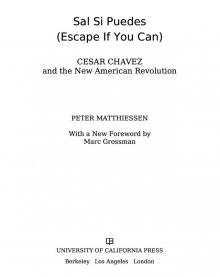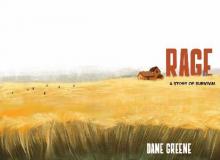Sal Si Puedes (Escape if You Can)


Author: Peter Matthiessen
Category: Other
Published: a long time ago
Series:
View: 406
Read OnlineIn the summer of 1968 Peter Matthiessen met Cesar Chavez for the first time. They were the same age: forty-one. Matthiessen lived in New York City while Chavez lived in Sal Si Puedes, the San Jose barrio where his career as a union organizer took off. This book is Matthiessen's panoramic yet finely detailed account of the three years he spent traveling and working with Chavez. In it, Matthiessen provides a candid look into the many sides of this enigmatic and charismatic leader who lived by the laws of nonviolence.
More than thirty years later, Sal Si Puedes is less reportage than living history. A whole era comes alive in its pages: the Chicano, Black Power, and antiwar movements; the browning of the labor movement; Chavez's series of hunger strikes; the nationwide boycott of California grapes. When Chavez died in 1993, thousands gathered at his funeral. It was a clear sign of how beloved he was, how important his life had been.
A new postscript by the author brings the reader up to date as to the events that have unfolded since the writing of Sal Si Puedes. Ilan Stavans's insightful foreword considers the significance of Chavez's legacy for our time. As well as serving as an indispensable guide to the 1960s, this book rejuvenates the extraordinary vitality of Chavez's life and spirit, giving his message a renewed and much-needed urgency.
More than thirty years later, Sal Si Puedes is less reportage than living history. A whole era comes alive in its pages: the Chicano, Black Power, and antiwar movements; the browning of the labor movement; Chavez's series of hunger strikes; the nationwide boycott of California grapes. When Chavez died in 1993, thousands gathered at his funeral. It was a clear sign of how beloved he was, how important his life had been.
A new postscript by the author brings the reader up to date as to the events that have unfolded since the writing of Sal Si Puedes. Ilan Stavans's insightful foreword considers the significance of Chavez's legacy for our time. As well as serving as an indispensable guide to the 1960s, this book rejuvenates the extraordinary vitality of Chavez's life and spirit, giving his message a renewed and much-needed urgency.
 Song of Resurgence (Ballads of Mae Book 2)
Song of Resurgence (Ballads of Mae Book 2) The Dimming Sun
The Dimming Sun The Girl Who Cried Werewolf
The Girl Who Cried Werewolf Child Bride
Child Bride Rage: A Story of Survival
Rage: A Story of Survival Crashed
Crashed Gender Swapped Volume Three
Gender Swapped Volume Three Their Outlaw Bride (Bridgewater Brides)
Their Outlaw Bride (Bridgewater Brides)